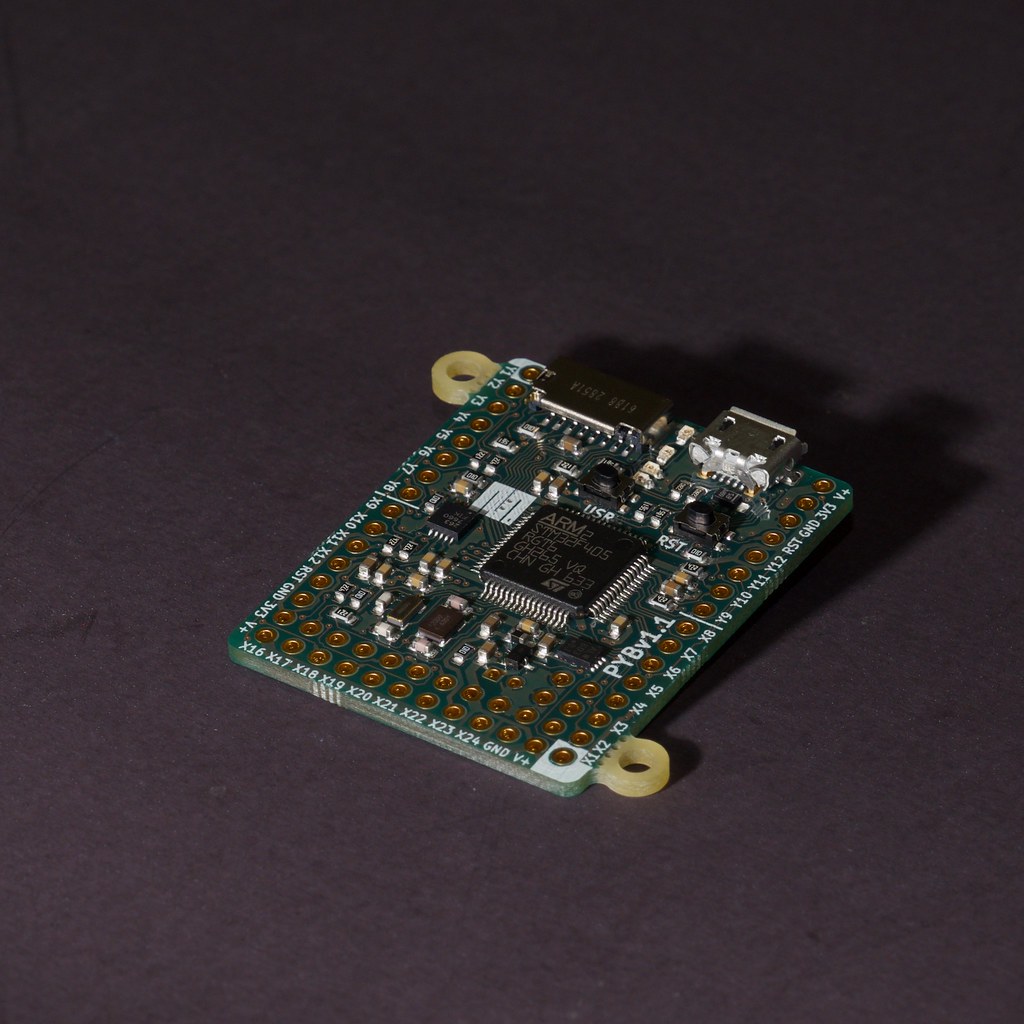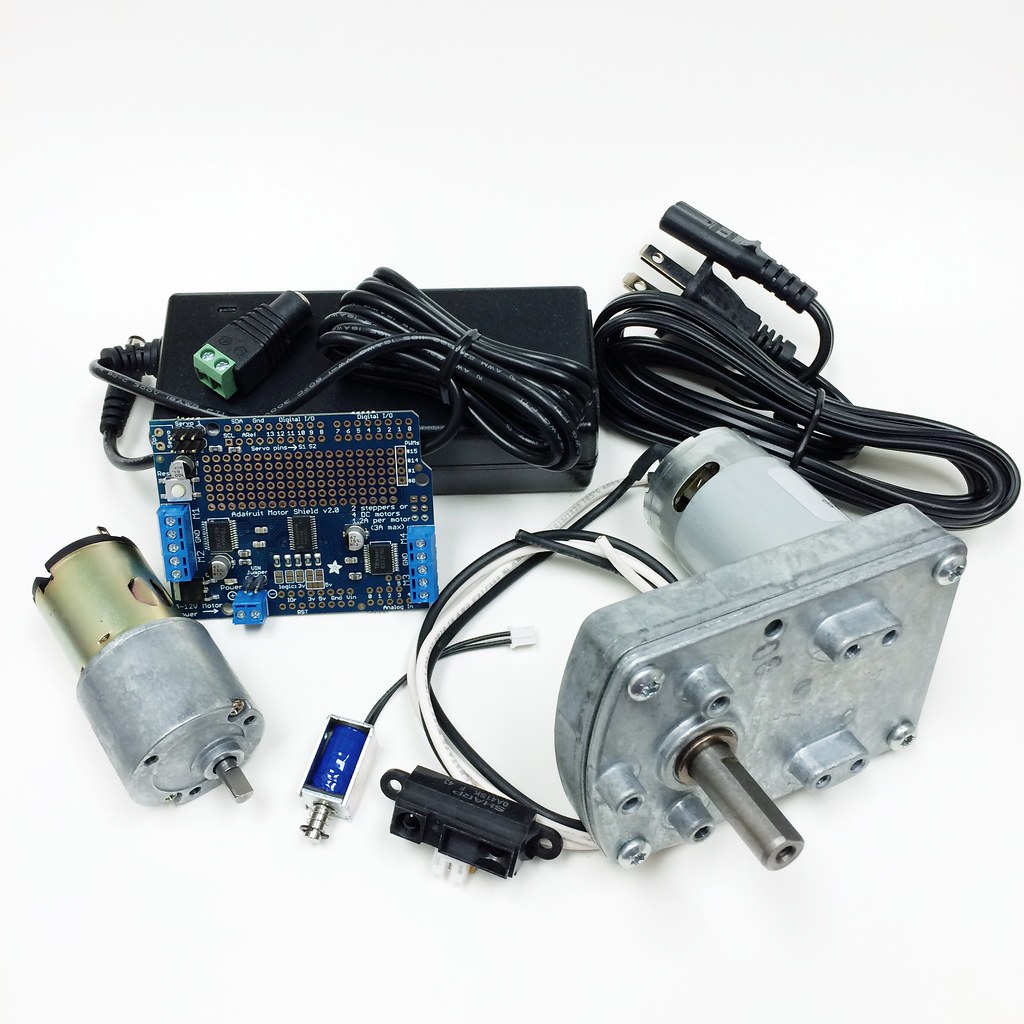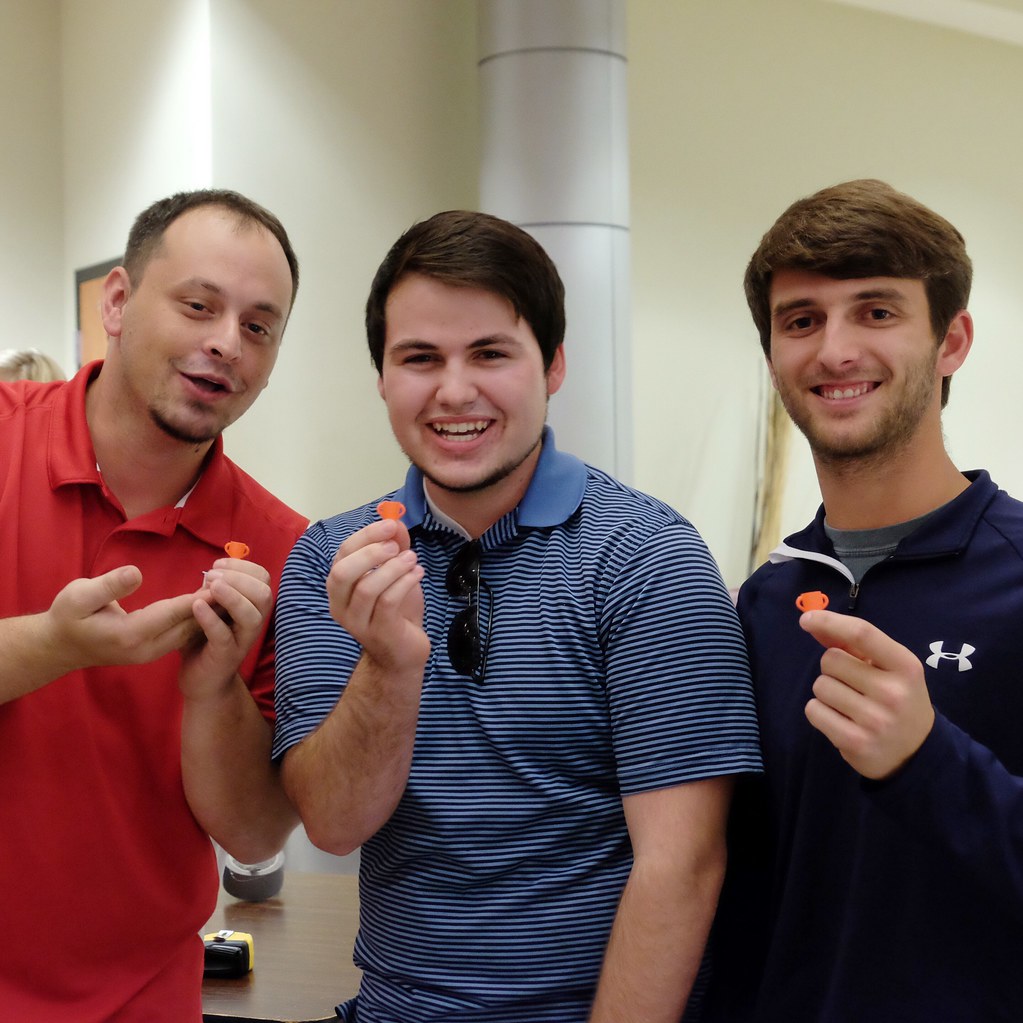Teaching Activities
Teaching Philosophy
I have a strong belief in problem- and project-based learning methodologies and providing hands-on experiences whenever possible. Students that struggle under traditional lecture-style teaching are often able to excel once they are able to see the concepts applied to a real, physical system. Framing course concepts with real-world example problems not only helps students develop their engineering intuition and general problem solving abilities, but it also provides significant motivation to perform well.
Project- and problem-based methodologies also fit well with the courses that I have most frequently taught here at UL Lafayette. As might be expected, the courses I have taught contain significant overlap with the my areas of expertise, interests, research area, and prior teaching experience. This overlap also means that experimental platforms developed during the course of my lab's research have also seen use in the classroom.
I also believe that a project-based curriculum pushes students toward being educated on a topic and not just trained to blindly follow a solution procedure. A common debate of engineering education is where it should fall on the spectrum between training and educating. I fall far along that spectrum toward educating. I work hard to develop my classes in a way that encourages, or perhaps requires, the students to understand why a solution procedure works (or doesn't work), rather than just memorizing the procedure itself. I feel that this best prepares our students to follow a diverse variety of career paths and to be able to continually adapt to an ever-changing suite of engineering tools and applications.
I also strongly believe that students must be encouraged to take responsibility for their own learning. In that light, I feel that our job's as educators, particularly at the collegiate level, is to help the students learn the material we are presenting in our classes. I do my best to frame my class structure and discussions around that idea. Knowledge cannot imputed to the students; they must make some effort to learn. Through that lens, I've made significant efforts to provide resources to our students to aid their learning, including creating instructional videos, providing both notes and audio from most lectures, and through developing and publicly sharing a significant amount of example code.
Courses Taught
In the sections below, each of the courses that I've taught here at the University of Louisiana at Lafayette is listed. For each listing, the official catalog description of the course is provided, along with a table listing the semesters that I taught the class and the enrollment for each of those semesters. The semesters listed within those tables also serve as a link to a PDF of the Student Evaluation of Instruction (SEI) for that session of the course. Within each section, a link is also provided to the class website that I have developed. For the two classes I am currently teaching (Spring 2018), a link is also provided to the website of a past session of the class so that the full range of materials provided to the students can be seen. Two short courses that I was invited to teach at international universities are also listed. Clicking on any of the links below will jump to that class on this page.
The courses that I have taught are:
- MCHE 201: Introduction to Engineering Design
- MCHE 470: Special Topics — Robotics
- MCHE 470: Special Topics — Senior Projects
- MCHE 470: Special Topics — Independent Study
- MCHE 474: Control Systems
- Project Mentor for MCHE 482/484: Senior Projects I/II
- MCHE 485: Mechanical Vibrations
- MCHE 513: Intermediate Dynamics
- MCDDT: Mechatronics, Creative Decisions, and Design Tools
- Modern Approaches to System Dynamics and Control
MCHE 201: Introduction to Engineering Design
Official Course Description: Techniques for creating, evaluating, synthesizing, implementing, and documenting solutions to open ended engineering problems, team and project management.
Prerequisites: MCHE 101, ENGR 211
Class website: Fall 2017 Session, Current Session
| Semester | Enrollment |
|---|---|
| Spring 2015 | 18 |
| Fall 2015 | 33 |
| Spring 2016 | 47 |
| Fall 2016 | 69 |
| Spring 2017 | 75 |
| Fall 2017 | 93 |
| Spring 2018 | 57 |
Enhancements to Student Learning and Experience
MCHE 201: Introduction to Engineering Design was a new course as part of the MCHE curriculum change in 2013 and was taught for the first time in Spring 2015. The class teaches high-level design tools and technical communication through a series of projects, ending in a robotics project that lasts for approximately the second half of the semester.
Through these projects, the students are introduced to basic programming, many for the first time. They also gets hands-on experience throughout the semester, something that is still uncommon for early-curriculum courses. The students also get significant technical communication experience, generating six written reports and giving five presentations during the semester. In recent semesters, due to class size constraints, students have actually submitted videos of their presentations, rather than presenting live during the class period.
I provide significant resources in support of this work. To date, I have raised $13,722 through internal UL Lafayette grants in support of the class and orchestrated the donation of 40 pneumatics kits, at an estimated total value of over $10,000. In addition, I provide 90 example scripts to the support their programming exercises, along with 22 example circuits drawn in Fritzing. The source code and raw, editable Fritzing files are all available to the students on the class GitHub repository. I have also created eight instructional videos for content in the course and publish all lecture notes along with an audio recording of the lecture. Finally, we provide open lab hours for the students to develop and test their robots for the final project. We typically offer 15+ hours per week of open lab time, of which I have, to date, personally covered at least half.
Much more detail on this class can be found on the class website linked above and on the Scholarly Activities section of this application.
MCHE 470: Special Topics — Robotics
Official Course Description: Robots are increasing in ubiquity and becoming a more important part of the global economy. In addition, continued improvements mean that robots are finding their way into industries that once shunned their presence.
This course will cover the fundamentals of robot design and control, with focus on application. Students will implement fundamental robotics algorithms on a variety of robots. A large portion of the course will be the design and build of a robot for participation in a class competition.
Prerequisites: ENGR 313, MCHE 363
Class website: http://www.ucs.louisiana.edu/~jev9637/MCHE470.html
| Semester | Enrollment |
|---|---|
| Fall 2013 | 30 |
Enhancements to Student Learning and Experience
This session of MCHE470 was offered prior to the first offering of MCHE 201: Introduction to Engineering Design and was used, in part, to develop the pacing and for the MCHE201 robotics contest. This class, instead of using the robotics project to teach mechanical design, used a similar project to teach robotics. The topics of this survey-style course included Arduino programming, PID control, Input Shaping control, sensor processing, machine vision, navigation and planning, machine learning, and human factors.
Some pictures from the final robotics contest, attended by Dr. Savoie, are included in this section. More can be found on a flickr album for the class.
MCHE 470: Special Topics — Senior Projects
Official Course Description: None
These four students were selected for a senior design project commissioned by the Krewe of Bonaparte. The project timeline required them to begin work ahead of the normal senior projects schedule, so this class was created for them.
| Semester | Enrollment |
|---|---|
| Fall 2013 | 4 |
MCHE 470: Special Topics — Independent Study
Official Course Description: None
Various research projects conducted by undergraduate students to fulfill a technical elective requirement. Of these six students, five continued to graduate school, with three remaining at UL Lafayette and in my laboratory.
| Semester | Enrollment |
|---|---|
| Spring 2014 | 2 |
| Spring 2015 | 2 |
| Fall 2015 | 1 |
| Spring 2016 | 1 |
MCHE 474: Control Systems
Official Course Description: Classical and modern control theory. Response of first and second-order systems, stability analysis and frequency response methods. Computer control of machines and processes.
Prerequisites: MATH 302, MATH 350, and ENGR 313 with a grade of C or better
Class website: http://www.ucs.louisiana.edu/~jev9637/MCHE474.html
| Semester | Enrollment |
|---|---|
| Fall 2017 | 15 |
Enhancements to Student Learning and Experience
To date, I have only taught this class once, but hope to have the opportunity to teach it again in the future (but feel more strongly about offering a MCHE-centric graduate-level controls class). In the one session of instruction, I developed eight Jupyter Notebooks, which are all publicly available on the class’s GitHub repository. I also publish all lecture notes along with an audio recording of each lecture.
Project Mentor for MCHE 482/484: Senior Projects I/II
I have also supervised (and funded) a number of senior projects teams. Members of these teams have developed experimental equipment for my research lab, developed robots for entry into the ARLISS competition, and developed a complete Autonomous Surface Vessel control system for entry into the 2016 Maritime RobotX Challenge.
| Semester | Number of Teams |
|---|---|
| Spring 2013 | 1 |
| Fall 2013 | 2 |
| Spring 2014 | 3 |
| Fall 2014 | 2 |
| Spring 2015 | 2 |
| Fall 2016 | 2 |
| Spring 2017 | 1 |
| Fall 2017 | 1 |
MCHE 485: Mechanical Vibrations
Official Course Description: Analytical and laboratory investigations of single and two degree-of-freedom systems. Design of vibration dampers. Introduction of multi-DOF systems and modal analysis.
Prerequisites: ENGR 313, MATH 350, MCHE 301
Class website: Spring 2016 Session, Current Session
| Semester | Enrollment |
|---|---|
| Fall 2012 | 31 |
| Spring 2013 | 17 |
| Spring 2014 | 27 |
| Fall 2014 | 41 |
| Spring 2015 | 34 |
| Spring 2016 | 38 |
| Spring 2018 | 34 |
Enhancements to Student Learning and Experience
When I arrived at UL Lafayette MCHE 485: Mechanical Vibrations was a required part of the curriculum. In recent revisions of the curriculum, it has transitioned into being a technical elective. However, the class sizes have remained fairly large, as I think the students recognize the importance of understanding vibration (As I like to say in class, everything vibrates if you look closely enough.).
For this class, I have created a number of instructional videos, including 10 on lecture topics and a growing number (9 as of 02/14/18) of video walkthroughs of homework problem solutions. I also publish all lecture notes along with an audio recording of each lecture.
I also introduced some minor programming exercises and several projects to MCHE485. I have developed 32 Jupyter Notebooks that cover the core topics of the class, all publicly available on the class’s GitHub repository. There are typically two projects per semester, which are both geared toward vibration analysis of experimental systems in my research lab.
MCHE 513: Intermediate Dynamics
Official Course Description: Three dimensional rigid body motion in non-inertial reference frames. Orbital mechanics, including stability. Energy methods applied to mechanical systems. Computer applications utilized as appropriate.
Prerequisites: Basic course in dynamics
Class website: http://www.ucs.louisiana.edu/~jev9637/MCHE513.html
Enhancements to Student Learning and Experience
For this class, I developed seven Jupyter Notebooks, which are all publicly available on the class’s GitHub repository. I also introduced basic programming for modeling and simulation of complex dynamic systems and developed a series of mini-projects that ask the students to model and simulate responses for experimental systems from my research lab. I also publish all lecture notes along with an audio recording of each lecture.
MCDDT: Mechatronics, Creative Decisions, and Design Tools
Course Description: In the spring semester of 2016, I was invited to teach two weeks of MCDDT: Mechatronics Creative Decision and Design Tools at Huazhong University of Science and Technology (HUST) in Wuhan, China. HUST is one of the top-rated Mechanical Engineering programs in China. They expressed strong interested in developing a 2+2-style partnership with the College of Engineering here at the University of Louisiana at Lafayette. Unfortunately, to date that partnership has not been realized.
Pictures and Media:
| Semester | Enrollment |
|---|---|
| Spring 2016 | 25 |
Modern Approaches to System Dynamics and Control
Course Description: In the spring semester of 2018, I was invited to teach a short, one-week course on a topic of my choosing at at Kumoh National Institute of Technology (KIT) in Gumi, South Korea. During my lectures there, the International Office at KIT expressed a strong desire to form a more formal agreement with the University of Louisiana at Lafayette for student and research exchange.
Class website: http://www.ucs.louisiana.edu/~jev9637/Kumoh_January2018.html
Pictures: https://flic.kr/s/aHsm9kHByC
| Semester | Enrollment |
|---|---|
| Spring 2018 | 21 |






